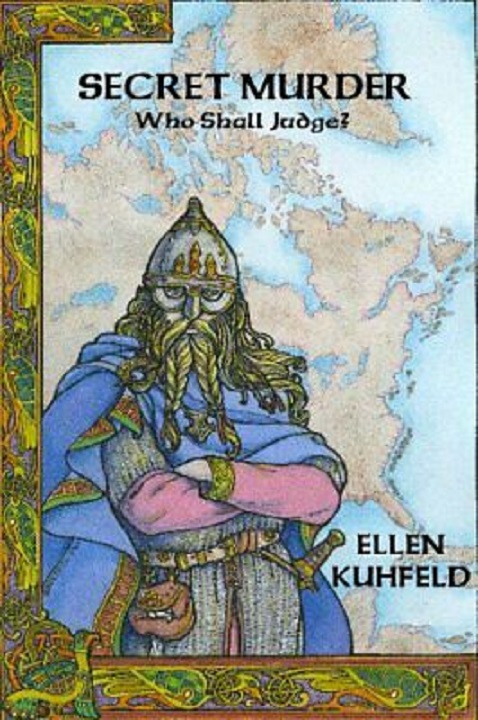Book Review: Secret Murder: Who Shall Judge? by Ellen Kuhfeld
Ragnar Forkbeard, iron-monger, and Olaf Far-Traveler, trader in exotic goods, have come from Surtsheim in the north to Northlanding, the falls that block boats from coming any further up the Great River. It is time for the great spring fair and the merchants have come from all over the New World to sell and trade here at the edge of English lands. Also here is Thorolf Pike, who was outlawed in Surtsheim for killing Snorri Crow, Ragnar’s old lord. He’s now a successful merchant himself in Northlanding, if not a well-liked one.

As unpopular as he is, there are plenty of suspects when Thorolf turns up dead, an arrow through his chest. But no one claims responsibility for this sneak attack, which makes it a crime by the standards of both the English law and the Northmen’s code–secret murder!
This murder mystery takes place in an alternate history where the Vikings never lost touch with Vinland, going on to form a thriving colony, while the English and French came up what we know as the Mississippi at a much earlier time due to pressure at home from more successful Islamic invaders in Europe. Thus the setting is a fanciful version of Minnesota, with a Scandinavian presence in the Iron Range. Northlanding is St. Anthony Falls, near the small city of Milltown (Minneapolis.)
While Ragnar is the main protagonist, we also get to see events from the viewpoints of Benedict, the fairgrounds manager; Otkar, Thorolf’s former right-hand man who’s trying to hold the followers together with him as their new leader; and Dirk, the bailiff’s deputy, who represents the English authorities.
Thorolf is mentioned to have had an adventure which is told in greater detail in the book Minnesota Vice.
This is a short novel, and despite the exotic setting plays out much like other historical mysteries you have read. The clash between the customs of the Northlanders and the English give some interest. Ragnar is aware of the White Christ, and gives homage to him, but is still a follower of Thor, and most of his men are still worshippers of the Norse gods.
One bit of interest is that Ragnar is also a poet, and he often drops bits of skaldic verse, including a “scorn-poem” that denounces an enemy. The cook, Gunnar, has been wounded in the head, and his dreams may or may not be prophetic (he may be simply be gifted with the ability to pick up on subconscious clues.)
Late in the story, the truth of Thorolf’s killer becomes known, and thus the subtitle of the book. Who shall judge this person, by Norse or English law? The answer may not satisfy some readers’ sense of justice.
I liked this book and think it should be better known. Recommended to fans of historical mysteries and Vikings.

